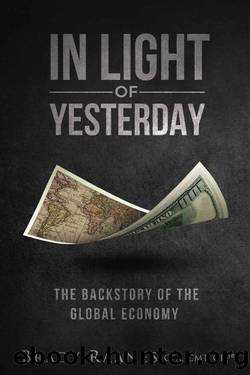In Light of Yesterday: The Backstory of the Global Economy by Brady Raanes

Author:Brady Raanes [Raanes, Brady]
Language: eng
Format: epub
Publisher: Brady Raanes
Published: 2019-10-24T20:00:00+00:00
14
NAFTA AND THE PESO
You Americans sell, we Mexicans buy.
â Shopper at newly opened Walmart in Mexico
Globalization was a key theme in the 1992 US presidential election. One of the main points of contention was a pending trade deal between the United States, Canada, and Mexico. The incumbent, President George Bush, had already begun negotiations to create a free trade zone that would remove trade barriers and tariffs in North America, but he was unable to finalize the deal before the election. The North American Free Trade Agreement, or NAFTA, became a focal point for candidates.
As the election neared, Ross Perot, an independent presidential candidate, became a vocal critic of the trade deal, describing the agreement as a zero-sum game. He represented the voice of Americans worried that without barriers to trade, millions of low-paying American jobs would be outsourced to Mexico. Perot repeatedly warned of a âgiant sucking soundâ of jobs leaving the United States for Mexico if the deal passed. His imagery resonated with voters, and support for NAFTA waned.
Bill Clinton, the Democratic Partyâs candidate and a former governor of Arkansas, viewed the deal through a different lens. Clinton was well acquainted with the potential benefits of globalization. The Walton family, founders of Walmart, had long been friends and supporters of the Clinton family throughout their ascension through the political ranks in Arkansas. In 1986, Bill Clintonâs wife, Hillary, had become the first female board member in the companyâs history, a position she held until 1992, when her husband made his run for the presidency.
Clinton had the advantage of witnessing firsthand, the success of Arkansas-based retail giant Walmart had enjoyed from its early ventures abroad. In 1991, Walmart entered into a 50-50 partnership with Cifra, Mexicoâs largest retailer. Cifra already understood Mexican culture and had the operational expertise to handle the logistics throughout the country. Walmart had the name recognition and the size and scale to drive down prices for consumers. Their first venture together was a Samâs Club in Mexico City.
Bethany Moreton wrote about Walmartâs entrance into Mexico in her book To Serve God and Wal-Mart: The Making of Christian Free Enterprise: âThe opening day of the worldâs largest Wal-Mart was appropriate to the historical moment. Mariachi musicians and scantily clad spokesmodels were just the beginning. Someone in a penguin costume did the cha-cha across the slippery tile floor of the 244,000-square-foot Wal-Mart Supercenter while amused customers watched.â
The Samâs Club in Mexico City had offered a glimpse of what was possible from overseas consumers, and Walmart was quick to support NAFTA and encourage policy initiatives that furthered globalization. Likewise, Bill Clinton remained supportive of the NAFTA legislation throughout the campaign and ultimately won the 1992 presidential election.
âWhen I entered the Clinton administration, there was a lot of excitement about what was going on in emerging markets,â said Jeffrey Garten, undersecretary of commerce for international trade in the Clinton administration. âThey were opening up to foreign investment . . . adopting capitalism for the first time. We were very excited about it and we pushed even harder for more opening.
Download
This site does not store any files on its server. We only index and link to content provided by other sites. Please contact the content providers to delete copyright contents if any and email us, we'll remove relevant links or contents immediately.
International Integration of the Brazilian Economy by Elias C. Grivoyannis(106938)
The Radium Girls by Kate Moore(12003)
Turbulence by E. J. Noyes(8008)
Nudge - Improving Decisions about Health, Wealth, and Happiness by Thaler Sunstein(7681)
The Black Swan by Nassim Nicholas Taleb(7091)
Rich Dad Poor Dad by Robert T. Kiyosaki(6580)
Pioneering Portfolio Management by David F. Swensen(6275)
Man-made Catastrophes and Risk Information Concealment by Dmitry Chernov & Didier Sornette(5982)
Zero to One by Peter Thiel(5770)
Secrecy World by Jake Bernstein(4729)
Millionaire: The Philanderer, Gambler, and Duelist Who Invented Modern Finance by Janet Gleeson(4449)
The Age of Surveillance Capitalism by Shoshana Zuboff(4268)
Skin in the Game by Nassim Nicholas Taleb(4225)
The Money Culture by Michael Lewis(4175)
Bullshit Jobs by David Graeber(4167)
Skin in the Game: Hidden Asymmetries in Daily Life by Nassim Nicholas Taleb(3980)
The Dhandho Investor by Mohnish Pabrai(3745)
The Wisdom of Finance by Mihir Desai(3721)
Blockchain Basics by Daniel Drescher(3568)
